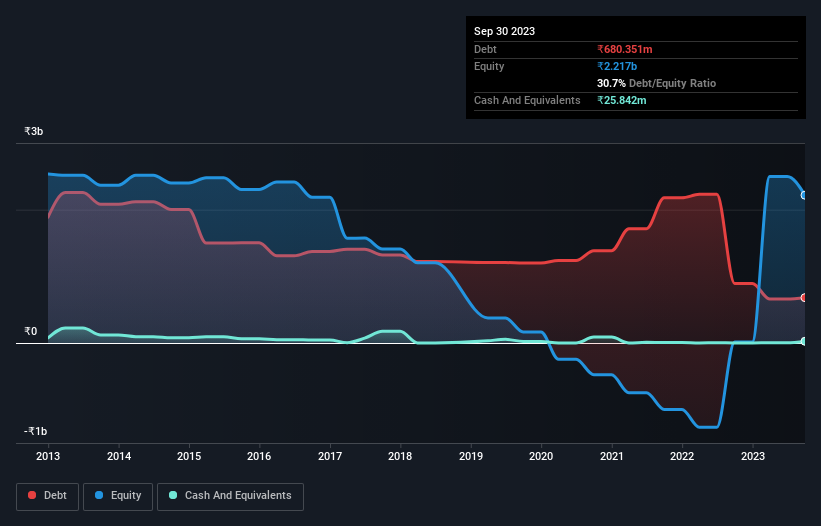Warren Buffett famously said, 'Volatility is far from synonymous with risk.' When we think about how risky a company is, we always like to look at its use of debt, since debt overload can lead to ruin. We note that Oil Country Tubular Limited (NSE:OILCOUNTUB) does have debt on its balance sheet. But the more important question is: how much risk is that debt creating?
What Risk Does Debt Bring?
Debt is a tool to help businesses grow, but if a business is incapable of paying off its lenders, then it exists at their mercy. In the worst case scenario, a company can go bankrupt if it cannot pay its creditors. While that is not too common, we often do see indebted companies permanently diluting shareholders because lenders force them to raise capital at a distressed price. Of course, plenty of companies use debt to fund growth, without any negative consequences. When we examine debt levels, we first consider both cash and debt levels, together.
View our latest analysis for Oil Country Tubular
How Much Debt Does Oil Country Tubular Carry?
You can click the graphic below for the historical numbers, but it shows that Oil Country Tubular had ₹680.4m of debt in September 2023, down from ₹893.6m, one year before. However, because it has a cash reserve of ₹25.8m, its net debt is less, at about ₹654.5m.

A Look At Oil Country Tubular's Liabilities
We can see from the most recent balance sheet that Oil Country Tubular had liabilities of ₹460.7m falling due within a year, and liabilities of ₹1.99b due beyond that. Offsetting these obligations, it had cash of ₹25.8m as well as receivables valued at ₹3.35m due within 12 months. So its liabilities total ₹2.43b more than the combination of its cash and short-term receivables.
This deficit casts a shadow over the ₹1.14b company, like a colossus towering over mere mortals. So we'd watch its balance sheet closely, without a doubt. After all, Oil Country Tubular would likely require a major re-capitalisation if it had to pay its creditors today. There's no doubt that we learn most about debt from the balance sheet. But it is Oil Country Tubular's earnings that will influence how the balance sheet holds up in the future. So when considering debt, it's definitely worth looking at the earnings trend. Click here for an interactive snapshot.
While it hasn't made a profit, at least Oil Country Tubular booked its first revenue as a publicly listed company, in the last twelve months.
Caveat Emptor
Over the last twelve months Oil Country Tubular produced an earnings before interest and tax (EBIT) loss. Indeed, it lost a very considerable ₹454m at the EBIT level. Considering that alongside the liabilities mentioned above make us nervous about the company. We'd want to see some strong near-term improvements before getting too interested in the stock. For example, we would not want to see a repeat of last year's loss of ₹553m. In the meantime, we consider the stock to be risky. When analysing debt levels, the balance sheet is the obvious place to start. However, not all investment risk resides within the balance sheet - far from it. For example Oil Country Tubular has 2 warning signs (and 1 which is potentially serious) we think you should know about.
If you're interested in investing in businesses that can grow profits without the burden of debt, then check out this free list of growing businesses that have net cash on the balance sheet.
New: AI Stock Screener & Alerts
Our new AI Stock Screener scans the market every day to uncover opportunities.
• Dividend Powerhouses (3%+ Yield)
• Undervalued Small Caps with Insider Buying
• High growth Tech and AI Companies
Or build your own from over 50 metrics.
Have feedback on this article? Concerned about the content? Get in touch with us directly. Alternatively, email editorial-team (at) simplywallst.com.
This article by Simply Wall St is general in nature. We provide commentary based on historical data and analyst forecasts only using an unbiased methodology and our articles are not intended to be financial advice. It does not constitute a recommendation to buy or sell any stock, and does not take account of your objectives, or your financial situation. We aim to bring you long-term focused analysis driven by fundamental data. Note that our analysis may not factor in the latest price-sensitive company announcements or qualitative material. Simply Wall St has no position in any stocks mentioned.
About NSEI:OILCOUNTUB
Oil Country Tubular
Manufactures and sells casing, tubing, and drill pipes used in the oil and gas drilling and exploration sector in India and internationally.
Excellent balance sheet and slightly overvalued.
Market Insights
Community Narratives




